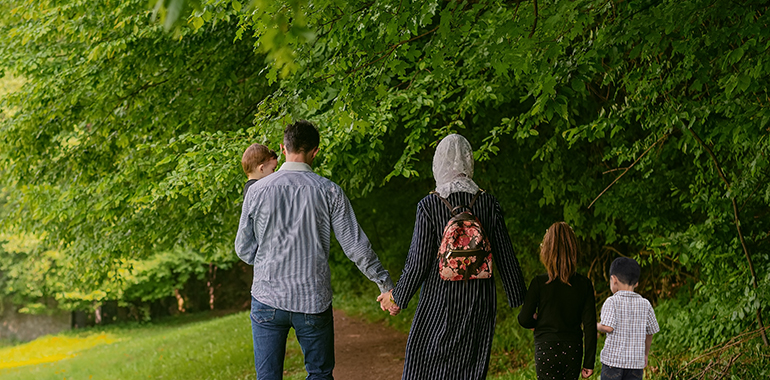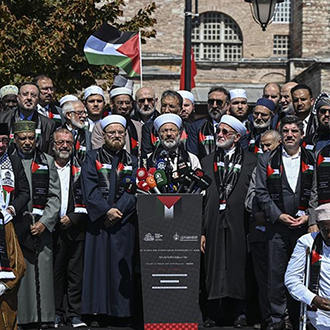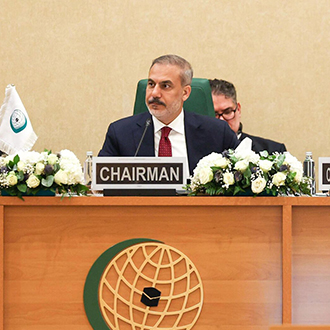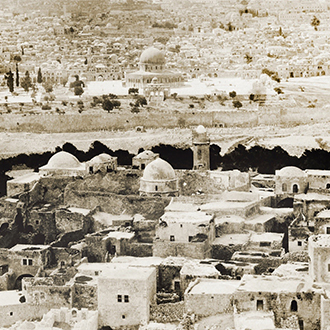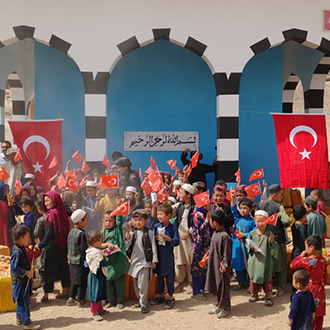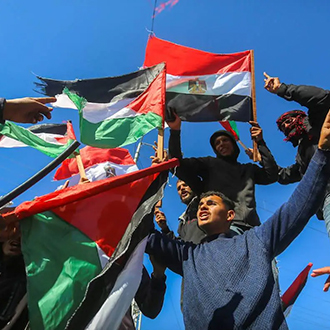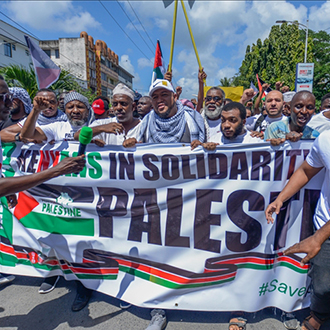So, her father questioned her and she replied, “We had a disagreement. He got angry at me and left. He did not take an afternoon nap with me.” Upon hearing this, Allah’s Messenger (saw) instructed people to search for ‘Ali. ‘Ali (ra) must have also felt remorseful. "Ali is in the mosque," they said, “lying down and sleeping in one corner of the mosque.” When the Messenger of Allah (saw) arrived at the mosque, he saw that ‘Ali’s clothes were about to come off of his back and his back was covered with dust (Bukhari, Salat, 58). The Messenger of Allah (saw) approached him and, while cleaning the dust from him, said teasingly, “Get up Abu Turab (lit. father of dust, that is, “Dusty”) (Muslim, Fadha’il al-Sahaba, 38). Since then ‘Ali (ra) has been called by this nickname.
With the loving and merciful hand of the Prophet (saw), anxiety turned to tranquility and cheerfulness. Allah’s Messenger, who was a peacemaker without taking sides, and who brought the couple together without causing harm, embraced them with love and dissolved the resentment that had arisen in a moment of anger, with mercy. He reminded ‘Ali and Fatima (ra) once again that they were a family, emphasizing their loving bond.
All the prophets were deeply involved in their families. For instance, Prophet Abraham gathered his family his family, and guests around his blessed table with fatherly affection and he called his father Azar to the message of Allah's unity before anyone else demonstrating his commitment to family (An’am, 6:74). Prophet Joseph forgave his brothers despite all they had done to him (Yusuf, 12:92). Prophet Jacob’s struggled with, and shed tears for his sons, Joseph and Benjamin (Yusuf, 12:84, 87), and Noah’s pleaded for his son (Hud, 11:42). Do these stories not exemplify the inexplicable hidden power of family ties?
Where does the power of being a family come from?
Our Prophet (saw), who said that Allah the Exalted stated, “I am Allah, and I am al-Rahman (the Compassionate One). I created the (mother’s) rahim (womb) and named it after My name. So whoever guards his kinship ties, I will guard him, and whoever severs his kinship ties, I will sever my tie with him,” (Tirmidhi, Birr, 9) seems to indicate the spiritual power behind this tie. This power is from the grace of Allah the Merciful. The more one lives in accordance with the pleasure of Allah, the stronger this bond becomes. Or vice versa for the weaker family, for the further the shadow of Allah’s mercy recedes, life becomes devoid of vitality and fulfillment.
The Arabic word “Usra” signifies family. It is the place where parents raise their children under the wings of compassion, guiding them to distinguish right from wrong, and a pair of warm hands hold the tiny palms of the child tightly. Etymologically “usra” carries the connotation of “armor” (Ibn Manzur, Lisan al-’Arab, IV, 19). Indeed, this is a fitting term for the family because it serves as a protective armor. Like armor, it envelops people with material provisions shielding them from external negativities. Simultaneously, it establishes rules and boundaries that shape the character and development of the child.
Our Prophet’s hadith, “O company of youth! Whoever among you can afford, he should marry, because it is the best thing to make him lower his gaze (from what is forbidden) and to guard his dignity,” (Bukhari, Nikah, 3) clearly indicates to us that marriage guards one’s honor and respectability, and gives protection for a virtuous life.
Being a family means coming together to form a complete and interconnected unit. In the vocabulary of the Holy Qur’an, the concept of being a family is described by spouses being referred to as garments for each other (Baqarah, 2:187). Being a spouse entails acknowledging one's own imperfections and finding completion through one's partner. It involves taking steps towards personal growth and striving for perfection while providing careful protection and support to one's partner, akin to covering them with a gentle cloth. The family is one of the greatest blessings of Allah. It is the place where love, happiness, and pleasure gain value by being shared.
The family is a stone thrown into the sea of mercy. It is just like the ripples that are formed on the surface of the water when we throw a stone in it; growing in circles like embracing the whole universe... A person draws the first circle with his wife and children; later on, this circle is surrounded by larger circles with grandparents, siblings, aunts, and uncles. Many individuals come together and experience the joy of being connected through the blessings of marriage, forming a network of kinship and familial bonds. The Messenger of Allah (saw) makes the following statement about the relationship of relatives: “Learn enough about your lineage to facilitate keeping your ties of kinship. For indeed keeping the ties of kinship encourages affection among the relatives, increases the wealth, and increases the lifespan.” (Tirmidhi, Birr, 49) The important thing is that people should first take care of the needs of their own families. Our beloved Prophet’s statement, “If a man spends on his family (with the hope of reward from Allah) then it is an act of charity for him,” (Bukhari, Iman, 41) encourages the believers to give priority to the maintenance of his family and meet its needs. He should first spend what he earns on himself and his family. Then, he should meet the needs of his relatives and, after that, others if he has the resources (Muslim, Zakat, 41). In this respect, parents should behave in a manner appropriate to their responsibilities and should not neglect their children. Our Prophet states that “It is sufficient sin for a man that he neglects those whom he maintains.” (Abu Dawud, Zakat,41)
Everyone in the family makes a contribution to the home according to their ability. Children are their parents’ helpers. Spouses look after each other. Parents protect their children. If there are elders in the family, they are respected. As experienced mothers or fathers, the family elders constitute a strong pillar of the family. The verse, “If either or both of them reach old age with you, say no word that shows impatience with them, and do not be harsh with them, but speak to them respectfully,” (Isra’, 17:23) strongly encourages us to be good to our parents throughout life.
There is no room for selfishness in the family. It is a place of continuous mutual help. Al-Aswad (ra) relates the following: “I asked ‘A’isha (ra), the wife of the Messenger of Allah (saw), ‘What did our Prophet (saw) used to do at home?’ ‘A’isha (ra) stated, ‘Allah’s Messenger used to be interested in the matters of his family, that is, he used to be at the service of his family. And when prayer time came, he used to leave for prayer.’” (Bukhari, Adhan, 44) Our Prophet (saw) was an exemplary spouse who never hesitated to assist his wife. He himself expressed this sentiment in the following words: “The most benevolent among you is the one who is benevolent to his family. I am the most benevolent to my family among you.” (Ibn Majah, Nikah, 50) The family is the place where loyalty is intertwined with self-sacrifice, faith with kindness, knowledge with wisdom, and love with respect.
Our family serves as our warm home, where the foundation of ethics, reason, and sensibilities that shape our lives are established. It is where our spirits are nourished with moral values. Within our family, we acquire the taste for prayer; discover the meaning of being a sibling, the dignity of being a parent, and the security of being a child. In the family, we reap the meaning of our existence, our surroundings, and the entire universe. It is within the family that we learn the virtue of sharing, sustaining our lives, overcoming challenges, and experiencing happiness together. Our families are a part of the family of humankind and through our families we shape humanity!



